Sudan has ordered the immediate evacuation of its nationals from Iran as Israeli airstrikes continue to target multiple Iranian cities, sparking regional fears of a broader conflict in the Middle East.
Prime Minister Kamil Idris instructed Sudan’s ambassador in Tehran, Abdel Aziz Hassan Salih, to ensure the safety of Sudanese citizens residing in Iran and begin preparations for their return, according to a statement by the Sudan News Agency (SUNA).
The decision follows a deadly exchange of hostilities between Iran and Israel that has left scores dead. After Tehran launched missiles at Israeli targets in Tel Aviv, Israel retaliated with aerial assaults on several Iranian cities, including the capital, Tehran.
Speaking by phone with Ambassador Salih, the Sudanese prime minister emphasized the need for “urgent and coordinated action” to safeguard the Sudanese community. He was reportedly assured of the well-being of embassy staff and Sudanese nationals.
Sudan’s Ministry of Foreign Affairs has condemned the Israeli military actions, describing them as “a dangerous escalation” and “a threat to regional and global peace.” The ministry called for an emergency response by the United Nations Security Council to halt what it referred to as “acts of aggression.”
Reports from Iranian authorities indicate that dozens have been killed and injured over the past two days. In East Azerbaijan province, local officials confirmed that 31 individuals—including military personnel and a Red Crescent aid worker—lost their lives in strikes on Tabriz. Additional reports cite the deaths of more than 60 civilians and senior military figures in Tehran alone.
Sudan’s evacuation order highlights growing concerns across African and Arab nations as tensions in the Gulf region continue to ripple outward. As diplomatic missions activate emergency protocols, governments across the continent are assessing the safety of their citizens in conflict zones.
This marks the second time in under a year that Khartoum has undertaken emergency evacuations due to external military operations, underscoring Sudan’s increased diplomatic engagement and its prioritization of citizen protection abroad.



